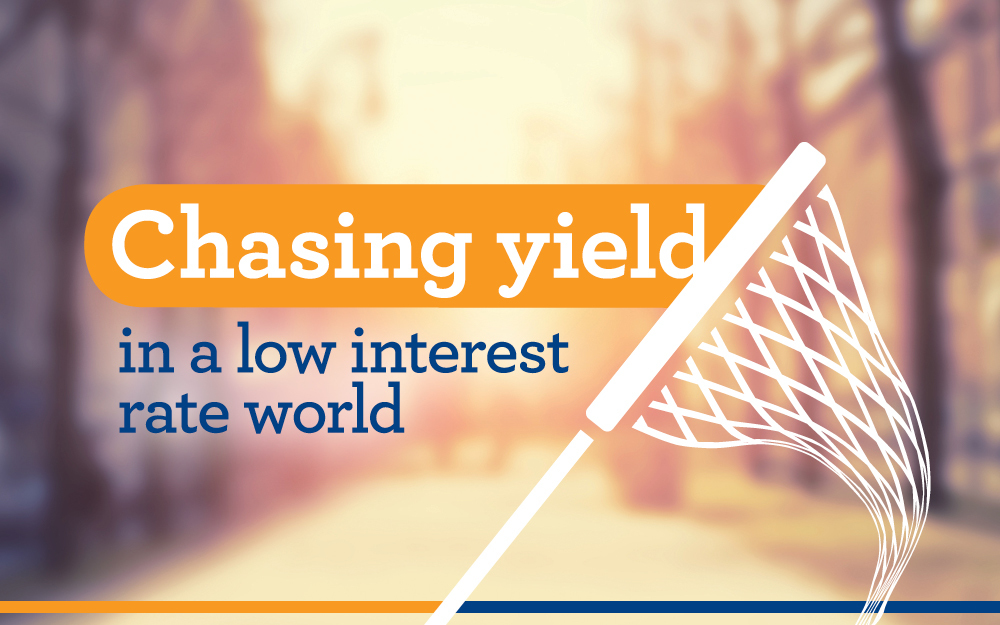
Low interest rates and unsettled sharemarkets make the chase for yield a challenging prospect. And yield is important, particularly for those approaching or already in the retirement phase. Because maintaining capital and enjoying a steady income stream are the two key factors to provide for comfort in the years ahead.
But how can you get a decent return when the cash rate is only 1.5 per cent and the interest rate on many traditional fixed interest investments is not much better?
According to Canstar, fixed term deposits are offering an average of 2.69 per cent for one year and 2.87 per cent for five years.i While it is above the inflation rate of 1 per cent, it’s still modest.ii
Of course, there are other conservative investments such as government bonds but even these offer only low returns. According to Bloomberg, 2-year government bonds have a yield of 1.59 per cent, five-year 1.74 per cent and 10-year 2.11 per cent.iii
Corporate bonds
Corporate bonds generally offer better returns than government bonds, term deposits or cash because they carry a higher risk. With corporate bonds, you are lending money to a business in return for interest payments compared with shares where you become a part owner of the company. You can buy the bonds via a prospectus, but these days many are traded on the ASX.
You can currently get yields of around 2.75 per cent for high quality, lower risk corporate bonds. But if you already have exposure to company shares on the market, then adding corporate bonds to your portfolio may reduce your level of diversification.
It is also worth considering investments such as hybrids, which have characteristics of bonds and shares, hence the name. You can currently get a yield of up to six per cent in hybrid issues from household name companies including the major banks, ultilities, retailers and insurers.
As an alternative to selecting individual bond issues, a professionally-managed bond fund offers the opportunity to invest in a diversified portfolio of corporate and government bonds and cash.
Good returns from shares
Shares continue to be attractive for investors looking for regular income. The average dividend yield for listed companies is 4.2 per cent; with capital growth, total returns are above 9 per cent. In the latest reporting season some $24 billion was paid out in dividends from Australian listed shares.
One key advantage of shares is dividend imputation, where you may actually end up with a cash rebate on the tax that has already been paid by the company.
Stocks such as banks and telcos are often viewed as good sources of yield although concentrating your investments in one or two sectors reduces diversification and increases risk.
Similarly, focusing exclusively on yield may mean that your portfolio is not as diversified as it should be.
Property options
Residential investment property has featured as a major source of investment returns in recent years, but with house prices high and rents tightening the yield has been falling. Add to this the lumpiness of an investment in property – you can’t just sell the kitchen if you need quick cash – and property may carry increasing risk.
Commercial property may be a better option given that in the year to March the average annual return was 14 per cent.
As an alternative to direct property, listed Real Estate Investment Trusts (REITS) invest in a diversified property portfolio and can be bought and sold on the sharemarket. Since March they have performed quite strongly.
The hunt for a decent yield in a low interest world is likely to be a feature of investment markets for some time. But your investments, and particularly those that constitute your retirement strategy, should be a long-term plan. Chopping and changing asset classes to try and get a good yield can prove costly.
Call us to discuss the best income-producing investments for your needs.
i www.canstar.com.au/term-deposits/the-current-term-deposit-environment/
ii www.tradingeconomics.com/australia/inflation-cpi
iii www.bloomberg.com/markets/rates-bonds/government-bonds/australia
Latest News Articles
Back to Latest News
What a Financial Plan Actually Looks Like

Realistic Budgeting Tips for Australians in 2026


